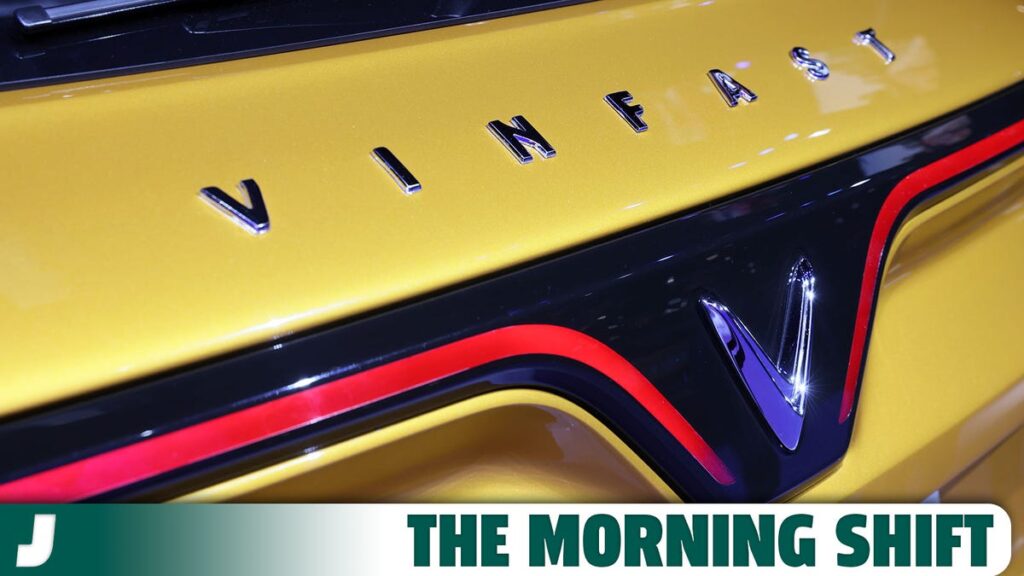VinFast Is Now Worth More Than Any Of America’s Big Three

Good morning! It’s Wednesday, August 16, 2023, and this is The Morning Shift, your daily roundup of the top automotive headlines from around the world, in one place. Here are the important stories you need to know.
Ultra Cruise is GM’s Answer to Tesla’s So-Called ‘Full Self-Driving’
1st Gear: VinFast Is Now An $85 Billion Company
Earlier this week, Vietnamese EV startup VinFast completed the final step for every good electric car maker: it floated on the stock exchange via a merger with a special purpose acquisition company (SPAC). Now, after shares initially sold around $13, the company’s valuation has skyrocketed to more than $85 billion as the share price rose by more than 270 percent.
Automotive News reports that, following the sale, VinFast is now the fourth most valuable automaker in the world, behind Tesla, Toyota, and Chinese carmaker BYD. In fact, the company is now worth more than Ford and GM’s market value combined. The site reports:
The Vietnamese company, which went public in a SPAC deal, is worth about $85 billion after shares soared Tuesday, rising to $37.06 in New York — up more than 270 percent from the SPAC’s IPO price and more than tripling the deal’s $23 billion implied equity value.
The share surge from the closing price of the SPAC on Monday makes the company the top performing de-SPAC to debut this year on a U.S. exchange.
But Automotive News warned that the high share price might not be here to stay. According to the site, 99 percent of the company remains locked away under the control of Pham Nhat Vuong, Vietnam’s wealthiest man, and VinFast’s founder. This left “a small number of shares available for trading.” With around 1.3 million shares on the market, the site explains that it could be prone to “large swings” in value.
Additionally, a report from Bloomberg warned that companies that float on the stock exchange in this manner are volatile investments, often losing some of their appeal to investors after the initial sale. As such, many SPAC mergers have seen a slump of around 45 percent in the months following their flotation.
2nd Gear: Berkshire Hathaway Halves Its Stake In GM
While everyone was snapping up VinFast shares, one investment firm was offloading shares in American automaker GM. According to the Detroit Free Press, Warren Buffett’s Berkshire Hathaway investment firm has slashed its stake in the Chevrolet owner by 45 percent. The site reports:
Billionaire investor Warren Buffett’s company Berkshire Hathaway has sold nearly half of its stake in General Motors, with experts speculating that the move was prompted by concern over slow electric vehicle launches and an uncertainty over UAW talks as the potential for a strike looms.
Berkshire Hathaway said it reduced its shares of GM stock from 40 million to about 22 million during the second quarter, according to Monday’s quarterly filing with the U.S. Securities and Exchange Commission.
Despite speculation that the offloading was due to GM’s strategy on electric vehicles, the DFP reports that Berkshire Hathaway “did not list a reason for the move.” However, there’s no secret that GM, like many legacy automakers, has struggled with its pivot to battery power.
So far this year, the company has faced troubles ramping up EV production as a result of battery module availability. GM, like other car makers in America, is also struggling against a shortage of rail cars to transport new vehicles from its factories out to dealers.
3rd Gear: Lordstown Motors Settles $40M Lawsuit
Despite filing for bankruptcy in June this year, struggling EV maker Lordstown Motors has now got to cough up $40 million to pay Karma Automotive over a lawsuit alleging that it stole intellectual property from the company. According to Bloomberg, Lordstown settled the lawsuit with Karma, which alleges that it “lifted designs and technology to develop its flagship Endurance truck.”
After a judge said that the case between the two companies should go to trial, Lordstown Motors elected to settle the case out of court, agreeing to pay $40 million. The settlement was uncovered in bankruptcy filings this week, as Bloomberg reports:
The settlement disclosed in bankruptcy court papers Tuesday averts an upcoming trial that threatened to derail Lordstown’s efforts to sell its business in Chapter 11.
The deal is for substantially less than the more than $900 million Karma had been seeking, but it ensures Karma is compensated despite Lordstown’s bankruptcy. Lordstown said that while it still disputes Karma’s allegations, a settlement was necessary to avert a costly and time-consuming jury trial that posed a “significant impediment” to its sale process and risked scaring off potential bidders.
California-based automaker Karma initially sued Lordstown Motors claiming that it poached its employees and attempted to steal company secrets. The case alleged that Lordstown stole technology that was used in the infotainment system on the Endurance pickup truck, which went into production earlier this year.
4th Gear: Canoo Only Lost $70.9 Million Last Quarter
On the subject of struggling EV makers, has anyone checked in on Canoo recently? Well, the startup has just filed its latest financial results and things aren’t looking good. They aren’t as bad as everyone expected, but they’re still bad.
According to Reuters, the company lost a whopping $70.9 million in the second quarter of 2023. But don’t worry, as that’s a massive drop compared with the $164.4 million that the company lost during the same period in 2023. Reuters reports:
Electric-vehicle maker Canoo (GOEV.O) posted a smaller-than-expected quarterly loss on Monday on lower research and development costs, sending its shares up 2% in extended trading.
Research and development costs fell about 67% in the quarter, lowering operating expenses to $73.6 million from $173.5 million a year earlier.
Despite the slight change in fortunes, Canoo reiterated its worries that it might not be able to “to continue operations for twelve months,” reports Reuters. However, this didn’t stop the firm from unveiling another new model. During the earnings presentation, Canoo threw the covers off its new lifestyle delivery vehicle 190, which has and increased payload load and length over the original 130 lifestyle delivery vehicle.
Here’s hoping the company can survive long enough to put this into production, it looks like it would make a great EV camper of the future.



